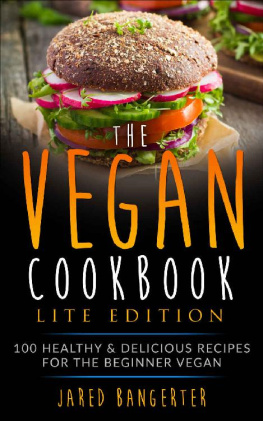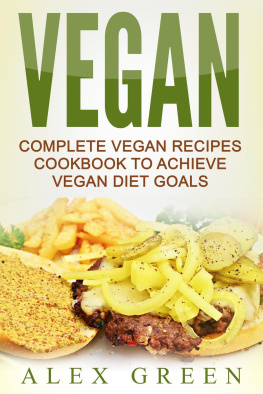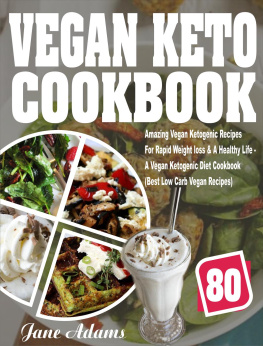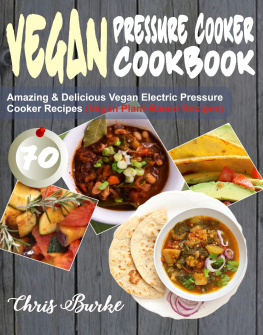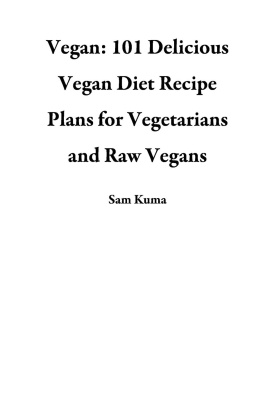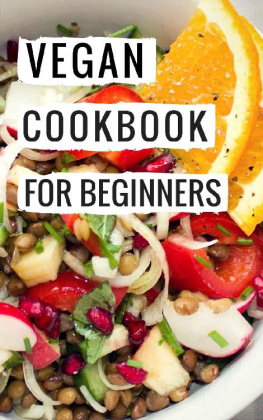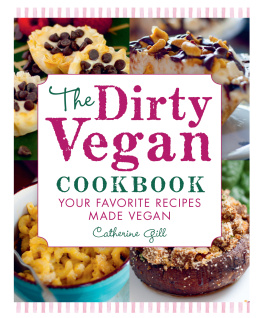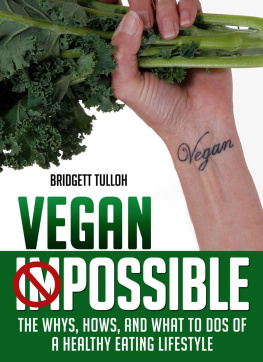I want to thank you for purchasing this in-depth vegan recipe book and, if you are a new vegan, congratulate you on taking the initiative to live in a way that is friendlier to the environment and the other creatures who we share our beautiful planet with. I furthermore would like to congratulate you on taking your first step to a whole new life full of radiant health and meaning.
This is the perfect cookbook for any vegan, new and experienced alike. This is also the perfect cookbook for anyone who wants more variety the spice of life in their diet without compromising their health or violating their moral obligation to the environment around them. This book contains an abundance of 100 different vegan recipes to keep YOUR taste buds satiated and your body rich in health. This book is just what you need to be able to live the vegan way without feeling deprived. As you read through this book, uncover a whole new world full of flavors from full on stand-alone meals to smoothies and desserts that are bound to delight even the most discriminating of taste buds!
In addition to recipes, you will find scientific evidence suggesting why you and everyone who you care about and love should convert to veganism for your own and their own health and longevity.
Everything you could ever hope for and more from a vegan cookbook is all present here. May this book prove to be a blessing for yourself and those who you love the most.
Copyright 2018 by Vegan 4 Life - All rights reserved.
This document is geared towards providing exact and reliable information regarding the topic and issue covered. The publication is sold with the idea that the publisher is not required to render accounting, officially permitted, or otherwise, qualified services. If advice is necessary, legal or professional, a practiced individual in the profession should be ordered.
From a Declaration of Principles which was accepted and approved equally by a Committee of the American Bar Association and a Committee of Publishers and Associations.
In no way is it legal to reproduce, duplicate, or transmit any part of this document in either electronic means or in printed format. Recording of this publication is strictly prohibited and any storage of this document is not allowed unless with written permission from the publisher. All rights reserved.
The information provided herein is stated to be truthful and consistent, in that any liability, in terms of inattention or otherwise, by any usage or abuse of any policies, processes, or directions contained within is the solitary and utter responsibility of the recipient reader. Under no circumstances will any legal responsibility or blame be held against the publisher for any reparation, damages, or monetary loss due to the information herein, either directly or indirectly.
The health and fitness advice in this book is by no means intended as a replacement for medical advice. By using this book, you acknowledge that you are solely responsible to seek the advice of your doctor or medical counselor before following any advice herein. The author nor the publisher will not be held liable for any damages resulting from the use of the information in this book.
Respective authors and photographers own all copyrights not held by the publisher.
The information herein is offered for informational purposes solely, and is universal as so. The presentation of the information is without contract or any type of guarantee assurance.
The trademarks that are used are without any consent, and the publication of the trademark is without permission or backing by the trademark owner. All trademarks and brands within this book are for clarifying purposes only and are the owned by the owners themselves, not affiliated with this document.
Table of Contents
Chapter 1: The Science of Veganism
What if I told you that there is a science to optimized veganism? Sure, simply eliminating meat and all animal products from your diet will significantly boost your health and prevent disease, but there is so much more you can do for your body than the simple basics. If you're going to go vegan, you might as well do it in a way that will optimize your health to its maximum potential. That's exactly what this chapter of the book is about taking basic veganism to the next level and tapping into the touted vegan super powers you always hear so much about. The key to doing this is incorporating what I have coined The Perfect Seven. In this chapter, you will learn what exactly The Perfect Seven is and why they are so important to a well-balanced, fully optimized vegan nutrition plan. Before we get into The Perfect Seven, it's important to understand the basics of veganism. What science is there that has shown its superiority to a standard omnivore diet?
In 1999, EPIC conducted a study that sought to discover whether there was any difference in the prevalence of heart disease between three distinct populations: vegans, standard vegetarians and meat-eaters. For the first time ever, the results of this study showed an edge of superiority in veganism over vegetarianism. Vegans were shown to be a whopping 26% less likely to develop heart disease than meat eaters, while vegetarians were only 24% less likely.
Another study was conducted in 2009. This study examined differences in mortality between vegetarians and vegans in comparison to non-vegetarians. The study examined the population of the Christian denomination 7 th Day Adventists, as they preach the benefits and principles of a vegetarian diet in their faith. The 7 th Day Adventist study found that vegetarians and vegans do live a few years longer than their meat-eating counterparts. To be specific, 7 th Day Adventist women were found to live 2.52 years longer than meat-eating women and the men were found to live 3 years longer than meat-eating men. In addition to differences in lifespan, it also revealed that meat-eaters are ~50% more likely to develop hypertension and diabetes. The study also looked at general differences in average Body Mass Index (BMI) between the two groups and found that the average vegan BMI was 23.6, while the average non-vegan BMI was a whole 5.2 points higher at 28.8! For reference, a BMI between 20 and 25 is considered to be in the healthy range. Anything higher than 25 is considered to be overweight and anything higher than 30 is counted as obese.
A study on cholesterol ratings found vegans on average are ranked at 160, while non-vegans are ranked at 180. A whopping 20-point difference in cholesterol, which is correlated to a host of various life-shortening diseases, should be more than enough reason alone for anyone to consider switching to a full vegan diet.
In 2002, EPIC Oxford conducted yet another study. This time, the study was on the prevalence of hypertension between vegan and non-vegan populations. They found
that the age-adjusted prevalence of self-reported hypertension of vegan males was only 6% and females was only 8%, while non-vegan males was 15% and females was 12%.
Cross sectional rates in AHS-2 (Type-2 Diabetes) found that vegans are more than 50% less likely to be diagnosed with Type-2 Diabetes! Furthermore, naturopathic doctors have shown great success in treating their patients who have Type-2 Diabetes with the use of a properly balanced vegan diet.
With all of these scientifically proven benefits supporting a vegan diet, is it any wonder more and more people are waking up to the facts and converting to veganism every day? There is a catch though, and this is unfortunately the pitfall most new vegans fall into: deficiencies.

